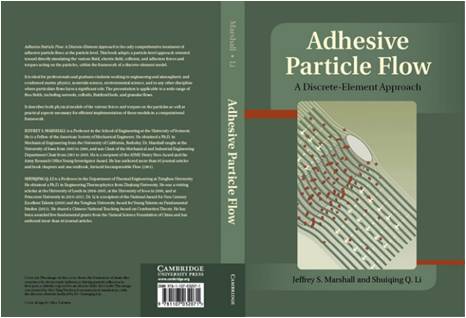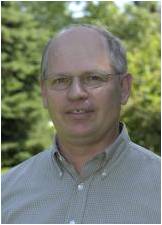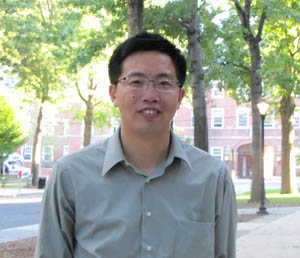Adhesive Particle Flow: A Discrete-Element Approach offers a comprehensive treatment of adhesive particle flows at the particle level. This book adopts a particle-level approach oriented toward directly simulating the various fluid, electric field, collision, and adhesion forces and torques acting on the particles, within the framework of a discrete-element model.
It is ideal for professionals and graduate students working in engineering and atmospheric and condensed matter physics, materials science, environmental science, and other disciplines where particulate flows have a significant role. The presentation is applicable to a wide range of flow fields, including aerosols, colloids, fluidized beds, and granular flows.
It describes both physical models of the various forces and torques on the particles as well as practical aspects necessary for efficient implementation of these models in a computational framework.
|
 |
 |
Jeffrey S. Marshall is a Professor in the School of Engineering at the University of Vermont. He is a Fellow of the American Society of Mechanical Engineers. He obtained a Ph.D. in Mechanical Engineering from the University of California, Berkeley. Dr. Marshall taught at the University of Iowa from 1993 to 2006, and was Chair of the Mechanical and Industrial Engineering Department Chair from 2001 to 2005. He is a recipient of the ASME Henry Hess Award and the U.S. Army Research Office Young Investigator Award. He has authored more than 95 journal articles and book chapters and one textbook, Inviscid Incompressible Flow (2001).
|
 |
Shuiqing Li is a Professor in the Department of Thermal Engineering at Tsinghua University. He obtained a Ph.D. in Engineering Thermophysics from Zhejiang University. He was a visiting scholar at the University of Leeds in 2004¨C2005, at the University of Iowa in 2006, and at Princeton University in 2010¨C2011. Dr. Li is a recipient of the National Award for New Century Excellent Talents (2009) and the Tsinghua University Award for Young Talents on Fundamental Studies (2011).He shared a Chinese National Teaching Award on combustion Theory. He has been awarded five fundamental grants from the Natural Science Foundation of China and has authored more than 40 journal articles.
|

 Jeffrey S. Marshall is a Professor in the School of Engineering at the University of Vermont. He is a Fellow of the American Society of Mechanical Engineers. He obtained a Ph.D. in Mechanical Engineering from the University of California, Berkeley. Dr. Marshall taught at the University of Iowa from 1993 to 2006, and was Chair of the Mechanical and Industrial Engineering Department Chair from 2001 to 2005. He is a recipient of the ASME Henry Hess Award and the U.S. Army Research Office Young Investigator Award. He has authored more than 95 journal articles and book chapters and one textbook, Inviscid Incompressible Flow (2001).
Jeffrey S. Marshall is a Professor in the School of Engineering at the University of Vermont. He is a Fellow of the American Society of Mechanical Engineers. He obtained a Ph.D. in Mechanical Engineering from the University of California, Berkeley. Dr. Marshall taught at the University of Iowa from 1993 to 2006, and was Chair of the Mechanical and Industrial Engineering Department Chair from 2001 to 2005. He is a recipient of the ASME Henry Hess Award and the U.S. Army Research Office Young Investigator Award. He has authored more than 95 journal articles and book chapters and one textbook, Inviscid Incompressible Flow (2001). Shuiqing Li is a Professor in the Department of Thermal Engineering at Tsinghua University. He obtained a Ph.D. in Engineering Thermophysics from Zhejiang University. He was a visiting scholar at the University of Leeds in 2004¨C2005, at the University of Iowa in 2006, and at Princeton University in 2010¨C2011. Dr. Li is a recipient of the National Award for New Century Excellent Talents (2009) and the Tsinghua University Award for Young Talents on Fundamental Studies (2011).He shared a Chinese National Teaching Award on combustion Theory. He has been awarded five fundamental grants from the Natural Science Foundation of China and has authored more than 40 journal articles.
Shuiqing Li is a Professor in the Department of Thermal Engineering at Tsinghua University. He obtained a Ph.D. in Engineering Thermophysics from Zhejiang University. He was a visiting scholar at the University of Leeds in 2004¨C2005, at the University of Iowa in 2006, and at Princeton University in 2010¨C2011. Dr. Li is a recipient of the National Award for New Century Excellent Talents (2009) and the Tsinghua University Award for Young Talents on Fundamental Studies (2011).He shared a Chinese National Teaching Award on combustion Theory. He has been awarded five fundamental grants from the Natural Science Foundation of China and has authored more than 40 journal articles.